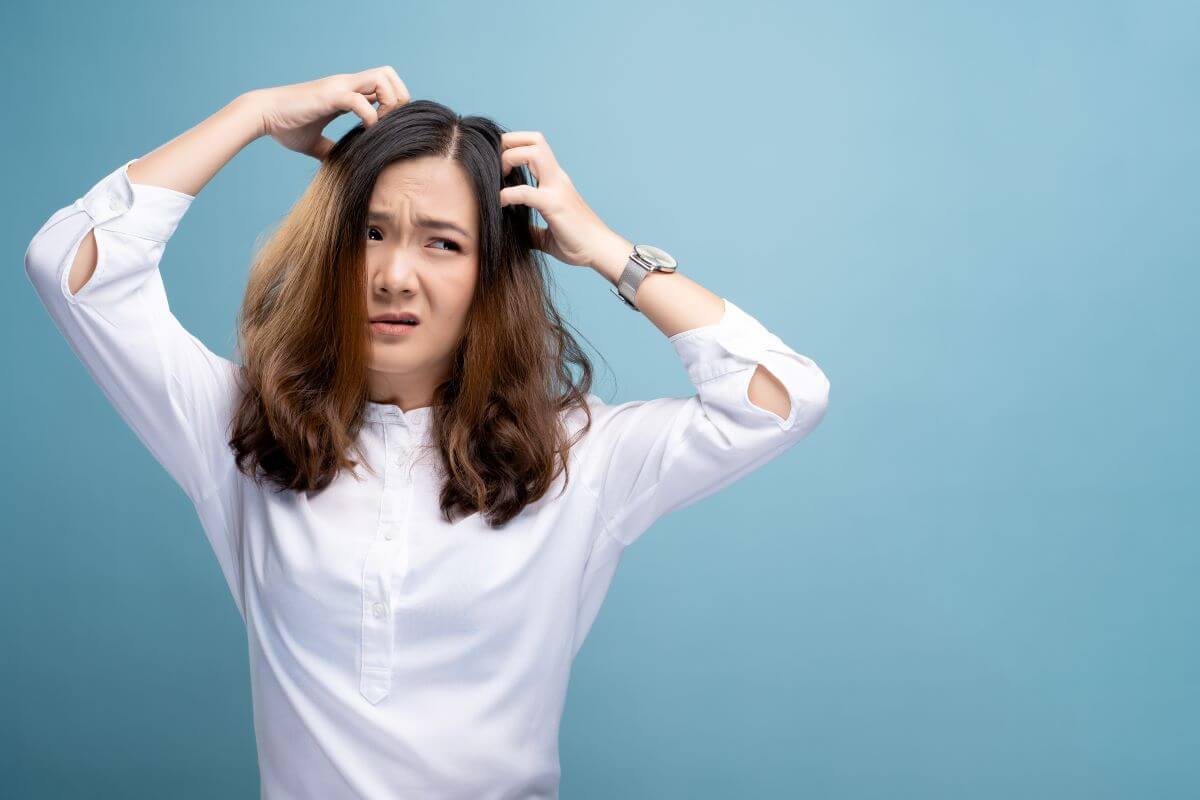The Discomfort of an Itchy Scalp
Dryness, flaking, and itching of the scalp are common skin health issues, and in most cases, the underlying causes of these symptoms are easy to treat. According to Dr. Sam Awan of U.S. Dermatology Partners in McKinney, Texas, “Once you understand the root cause of an itchy scalp, treatment is often simple, and combined with some at-home care and prevention steps, the results are long-lasting.” In this blog, Dr. Awan discusses common conditions that lead to itchy scalp, treatment options, and prevention steps.
The Culprits: Why Does My Scalp Itch?
According to Dr. Awan, “There are numerous underlying causes for itchy scalp, and it’s essential to determine the cause and find the right treatment. If you’re dealing with an itchy, irritated scalp, reach out to a dermatologist to schedule a consultation and discuss treatment options.” Some of the common causes of scalp itch include:
- Dandruff – dry, itchy, flaking skin on the scalp.
- Psoriasis – this is a chronic skin condition and autoimmune disorder that causes inflammation and itching. About half of people who have psoriasis experience flare-ups on the scalp. While the dry, flaky skin resembles dandruff, red and thickened patches of skin and more intense itching and burning set it apart.
- Eczema (atopic dermatitis) – skin reddening and itching on the scalp may be a sign of eczema.
- Folliculitis – a bacterial infection in the hair follicles. Common for those who shave their heads as this can damage the hair follicle, allowing bacteria in, which can cause inflammation, redness, and itching.
- Allergic reactions – hives, contact dermatitis, rashes, and other forms of allergic reaction can happen in response to hair care products, chemicals, or even sunlight.
- Fungal infection – ringworm is a fungal infection that commonly causes a very itchy, red rash on the scalp.
- Nerve damage – shingles, diabetes, scar tissue development, and other forms of damage can all cause an abnormal nerve response that leads to itching and burning on the scalp.
Lifestyle Influences: External Triggers for Scalp Discomfort
While most causes of scalp itch are outside of our control, there are some we can eliminate by adjusting our daily routines. Dr. Awan recommends, “Washing hair too frequently and using too many hair products are two of the main contributors to scalp itch and irritation. Simply cutting back on hair washing and streamlining your hair care routine will improve scalp health. Additionally, it’s important to be mindful of potential irritants in our environment and protect the scalp from them. This includes allergens like poison ivy, oak, and sumac as well as chemicals in pools and even in the water we shower with. Increase your awareness of these potential sources of scalp irritation and do your best to minimize exposure.”
Expert Recommendations: Dermatologist-Approved Treatments
When it comes to treating scalp itch, Dr. Awan says, “Talk to your dermatologist for recommendations to address the specific underlying causes of scalp itch. They can provide prescriptions if necessary, but in many cases, a simple over-the-counter hair care product or other medication is effective in treating itching and scalp irritation.”
Some of the most often recommended treatments for scalp itching include:
- Medicated shampoos – there are medicated shampoos available for lice, dandruff, and scalp psoriasis. Your dermatologist can recommend the best option. There are also soothing shampoos that may be recommended to help with general dryness.
- Topical treatments – your dermatologist may recommend topical treatments, including medicated ointments, deep moisturizers, and soothing serums.
- Prescription medications – scabies, ringworm, and many other underlying causes of itchy scalp have to be treated with prescriptions provided by a dermatologist. This may be oral or topical medications or a combination of the two.
- Laser treatments – safe exposure to high-intensity light can help to heal skin damaged by itching and inflammation.
At-Home Remedies: Alleviating Itchiness Naturally
Before trying a home remedy for itchy scalp, be sure to check in with your dermatologist. Some of the most popular at-home treatments for keeping the scalp healthy include:
- Coconut oil – this intensely moisturizing product soothes inflamed, dry, and itchy scalp. There are even some indications that coconut oil is beneficial as a delousing treatment.
- Tea tree oil – this ingredient can be found in many medicated shampoos and other hair care products. You can also use diluted tea tree oil on its own to improve scalp health. Tea tree oil has anti-fungal, anti-microbial, and anti-inflammatory properties, making it extremely beneficial in boosting scalp health.
- Colloidal oatmeal – this treatment is often recommended to soothe itchy, irritated skin for those with eczema, psoriasis, and other chronic skin conditions. It can also be used to relieve scalp itch and irritation.
Preventing Future Itches: Tips for a Healthier Scalp
When it comes to preventing dry, itchy scalp, it’s important to work with a dermatologist to develop a plan for ongoing scalp care with your dermatologist. In addition to following hair care steps outlined by the dermatologist, you may also want to consider the following preventive steps:
- Choose your hair care products wisely – avoid irritating shampoos with ingredients like sulfates, parabens, silicone, dyes, and fragrances. Look for gentle products that are free of these harsh ingredients that can leave the scalp feeling itchy and irritated.
- Shampoo well – shampooing properly ensures flakes and dry skin are removed without irritating skin. Use a gentle shampoo and take time to thoroughly work shampoo through the hair and massage the scalp to exfoliate and remove dead skin.
- Don’t skip conditioner – conditioning restores hydration to the scalp and hair. It’s soothing and moisturizing. A regular conditioner is essential, but you can also use a deep conditioning treatment or nourishing serum to boost hydration and reduce irritation and inflammation.
- Alleviate stress – use stress-relieving practices like yoga, deep breathing, or just taking time to relax and enjoy your favorite hobbies to reduce stress levels. Stress increases cortisol production, which can lead to inflammation and other concerns that contribute to dandruff, eczema, and oily hair.
- Get the right nutrients – omega-3 fatty acids, protein, antioxidants, and probiotics can all support overall health as well as help keep the scalp healthy.
- Protect the scalp from sun exposure – sun damage can contribute to scalp flaking, inflammation, and irritation. Wearing hats or applying sunscreen to the scalp prevents unnecessary scalp damage.
Embracing a Comprehensive Approach to Scalp Health
When it comes to scalp health for those who are struggling with itching and other concerns, Dr. Awan says, “A healthier scalp starts with an accurate diagnosis from your dermatologist. From there, they can help you find the best treatment options and partner with you to keep your scalp feeling its best. Don’t wait for issues to get worse. Talk to a professional right away.”
Need Help Achieving a Healthier Scalp?
If you’re struggling with an itchy scalp, your dermatologist can help you determine exactly what’s causing the itch. They can also partner with you to develop a treatment and prevention plan to maintain a healthy, itch-free scalp. When you’re ready to get started, simply take a few moments to complete our online scheduling request form. A local dermatology office will be in touch to finalize the details of your visit.
Find a location near me
or


